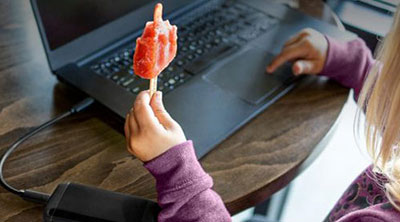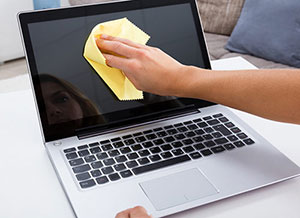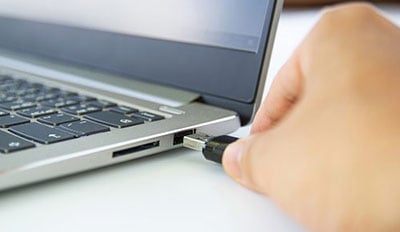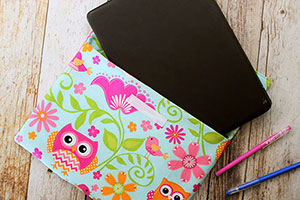Register
Worth Ave. Group - Providing peace of mind to consumers for over 50 years.
Tips for Teaching Laptop Care to Kids
Posted:
July 12, 2022
Categories:
General


When introducing laptops to kids, one of the most important things is to teach them how to use these devices correctly and safely. By teaching them how to take care of their laptop, you can help them develop responsible laptop habits, extend the lifespan of their device, and reduce the risk of incurring the most common damages.
Parents and teachers are in a great position to encourage good laptop care, so here are some tips you can share with your kids or students:
Keep Your Laptop Clean
 Have clean hands.
Have clean hands.
Never touch your laptop with dirty, sticky, or wet hands. Dirt, grease, or liquid can damage not only the surface of the device, but these things can easily get between the keys of the keyboard and cause some more severe issues. Wash and thoroughly dry your hands before using the laptop to keep it clean.
Keep food and drinks away from your laptop.
Crumbs and spilled liquids can work their way inside your keyboard and cause damage. For instance, crumbs can damage the keys or circuitry, while spilled liquids can damage the delicate internal components and ruin the entire device. So, try to refrain from eating or drinking near your laptop.
 Clean your laptop frequently.
Clean your laptop frequently.
If you don’t clean your laptop, it will become dirty in no time, so take a few minutes to clean the screen, keyboard, and accessories of dust, dirt, or residue. Turn off your laptop and disconnect all the cables and other devices before cleaning it. It’s best to clean it with a soft, dry microfiber cloth or anti-static cloth and computer-safe cleaning products. Make sure the laptop is completely dry before turning it on.
Use Your Laptop Properly
 Open and close your laptop carefully.
Open and close your laptop carefully.
When opening your laptop, do not open the screen roughly or further back than intended. And when closing it, close the lid gently, holding it from the center top front edge of the screen. Make sure there are no objects on the keyboard before closing the laptop. Pens, pencils, textbooks, toys, or headphones between the screen and the keyboard can crack the screen or damage the keyboard.
Use your laptop on a flat and clean surface.
Do not place your laptop on uneven or unstable surfaces or on the edge of a desk, so it doesn’t fall and break. Avoid using it on soft surfaces such as a bed, sofa, or carpets in order not to block its air vents and reduce airflow. This can cause overheating, leading to hard drive and circuit damage. Always use your laptop on a desk or table.
 Put your laptop away when not using it.
Put your laptop away when not using it.
Turn off your laptop and put it in a safe place when not in use. Also, never leave the laptop on the floor where you can step on it. And keep it out of reach of pets since they can knock it over or damage it.
Do not put things on top of your laptop.
Never place objects on top of the laptop when closed, or use it as a surface for writing or drawing. The hinges are not designed to withstand impacts, stress, or heavy loads, and laptop screens are susceptible to damage from excessive pressure.
Do not touch the screen with other objects.
Avoid touching the screen with other items, in particular sharp or pointed objects, such as pencils or pens, so you don’t scratch or damage it.
 Be gentle with connectors and ports.
Be gentle with connectors and ports.
Insert cables and peripheral devices like USB flash drives or headphones carefully into your laptop. Make sure they match the port and are positioned the right way before you insert them, and never force them into a port. Also, gently remove all plugged-in cables and peripheral devices before carrying your laptop. Do not yank the cords, so you don’t damage the ports.
Carry Your Laptop Safely
Close your laptop before carrying it.
Carrying the laptop by its screen or while it’s open can put pressure on the hinges and cause them to break. Also, it can lead to scratches on your screen, so carry your laptop only when it is safely closed and hold it carefully when taking it with you.
 Do not transport your laptop unprotected.
Do not transport your laptop unprotected.
Keep your device in a carrying case or backpack with a protective pocket specifically made for laptops when transporting your laptop. Do not carry an unprotected laptop in a bag full of books and other things because it can easily get damaged.
 Keep Your Laptop Cool
Keep Your Laptop Cool
Do not expose your laptop to extreme heat or cold.
Extreme cold and heat can damage the laptop, so do not leave it in a car or anywhere where it could be exposed to extreme temperatures for extended periods. Finally, laptops are sensitive to temperature changes, so it’s important to let them adjust to the temperature before turning them on, indoors or outdoors.
Get Laptop Insurance!
While teaching your kids or students about laptop care, don’t forget that accidents happen, no matter how careful they are, and repairing or replacing an accidentally damaged laptop can be extremely expensive. To avoid costly damages and get peace of mind, make sure your kid’s or student’s laptop is protected against cracks, drops, spills, or other common accidents. Get a free quote today!



 Have clean hands.
Have clean hands. Clean your laptop frequently.
Clean your laptop frequently. Open and close your laptop carefully.
Open and close your laptop carefully. Put your laptop away when not using it.
Put your laptop away when not using it. Be gentle with connectors and ports.
Be gentle with connectors and ports. Do not transport your laptop unprotected.
Do not transport your laptop unprotected. Keep Your Laptop Cool
Keep Your Laptop Cool








